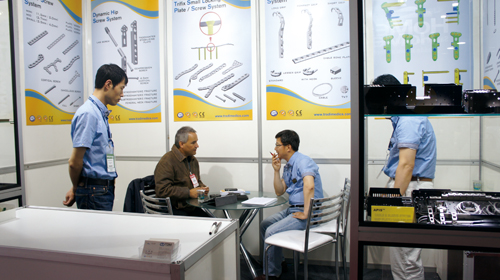TDM is a success story of SMBA’s program to provide support to SMEs seeking to obtain certifications
A view of Tradimedics (TDM), a Gwangju-based medical equipment maker
producing peek cage and suture kit, which is an exemplary beneficiary
of the Small and Medium Business Administration’s program to offer
a helping hand to SMEs wanting to acquire CE Marking and other certifications
in cooperation with the Korea Testing Laboratory (KTL) and Korea Testing &
Research Institute (KTR). (photos: courtesy of TDM)
By Oh Chung-sook
As Korea signs more and more free trade agreements (FTAs) with other countries to expand its economic territory, Korean companies are given more opportunities to tap into foreign markets. But Korean SMEs find it hard to make inroads into foreign markets particularly due to technical trade barriers, which are on the rise. Under the WTO Technical Barriers to Trade (TBT) agreement, standards have become the norm of global trade and they have changed into key tools for corporate management.
The Small and Medium Business Administration (SMBA) has been implementing a program to offer a helping hand to SMEs wanting to acquire CE Marking and other certifications in cooperation with the Korea Testing Laboratory (KTL) and Korea Testing & Research Institute (KTR) since 1998. The program is a long-standing boon for Korean exporters.
The SMBA has earmarked 23.26 billion won for implementing the program during this year in order to cope with national technical trade barriers, which are on the rise among nations, and is helping SME exporters expand their exporting capabilities. Out of the five sessions to receive applicants and select finalists during the year, the first and second ones have been so far held. Applications can be made until 6 p.m., Oct. 31, at www.exportcenter.go.kr.
During 2013, a combined 20.69 billion won, including 10 billion won from the supplementary budget designed to reinvigorate the national economy, was funneled into the program, and 2,327 companies benefited from the program by obtaining 3,763 certifications. Beneficiaries saw their average export value surge to $124 million in 2013, up from $54 million in 2012.
Beneficiaries are given support equivalent to anywhere from 50 percent to 70 percent of costs for obtaining overseas certifications: a maximum of 30 million won for ordinary overseas certifications and a maximum of 50 million won for overseas value-added certifications.
_트라디메틱스01jpg96.jpg)
TDM President Kim Sun-mi
TDM, a Front-Runner in Korean Medical Equipment for Fracture and Spine Correction Market Looks Overseas
An exemplary beneficiary of the program is Tradimedics (TDM), a Gwangju-based medical equipment maker producing peek cage and suture kit.
TDM is committed to developing homegrown medical equipment with the goal of rising to a Korean No. 1 orthopedic instrument maker. The company, which has obtained the CE Marking in recognition for its quality management corresponding to global standards, is now stepping on the gas to explore overseas markets. CE Marking on a product is a manufacturer’s declaration that the product complies with the essential requirements of the relevant European health, safety, and environmental protection legislation.
TDM saw its sales soar to 9 billion won and 1.8 billion won after obtaining the certification in 2013, a 55 percent surge and a 213 percent jump in Korea and overseas, respectively.
TDM, which is a front-runner in the Korean medical equipment for fracture and spine correction market, is turning its efforts to tapping the overseas market. The company already has a track record of registering 16 patents and applying for another seven. The company is on a roll as its products have been recognized at such fairs as the Arab Heath Exhibition & Congress that took place in Dubai this past January and MEDICA held in Germany as well as international academic seminars. In particular, TDM is working on joint studies on clinical safety and prowess from the stage of developing products with university hospital professors. The company develops and produces items in niche markets in a move to avoid a competition of attrition with its rivals on top of a focus on fostering talented manpower.

A TDM staff member explains his company’s products during a meeting
with a foreign buyer at a recent overseas fair.
TDM has made strides in a short period of time, earning a reputation in such countries as Turkey, Iran, Russia, Malaysia, Brazil, Colombia, and Taiwan. Its excellent performance is owed to TDM’s endless development of technologies. The company attaches top management priority to a balanced placement of talented manpower. The research institute at TDM’s headquarters, manned by doctorate-level researchers, is now concentrating on technology development by employing advanced precision fabrication equipment, while seasoned engineers with years of on-the-job experiences and equipment operation capability, are at work.
TDM has overhauled the existing processes and developed new ones thanks to government programs to provide a wide range of support. These have led to TDM’s cost cutting and process reduction to give it a competitive edge. The company has succeeded in releasing two to three new products yearly since its establishment thanks to the government’s R&D support programs, while making strenuous efforts to improve technological capabilities through collaboration among industry, academia, and research institute circles and joint R&D activities with its cooperative companies.
TDM is now working on the development of new orthopedic and neurosurgery technologies as part of its efforts to explore the creative and niche markets. For instance, the D-Close, in use for operation on disc patients, is in a clinical study. In accordance with its long-term development roadmap, TDM does not spare efforts to invest in the biomaterial segment with its synthetic crossbones, scheduled to go on the market soon.
TDM has 150 dealerships across the nation and export products to some 10 countries. Its next move is to make an inroad into the U.S. market.
